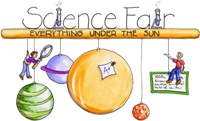

Freezer Fun
The Objective : The objective was to discover if different types of water (salt, carbonated, tap) can be supercooled, or cooled in a liquid state below the normal freezing temperature, in the same way that purified water can. Hypothesis: Salt water and carbonated water cannot be supercooled because the bubbles and salt crystals will act as seed crystals, starting the freezing reaction at 0 degrees Celsius. Tap water lacks a crystal nucleation site and will be able to be supercooled.
Methods/Materials
Four identical bottles were filled with salt water, tap water, carbonated water, and spring water.
All four bottles were placed in the freezer for either a 90 minute or 120 minute trial.
Each sample was observed to see if it was still in a completely liquid state or had started to crystallize.
Each sample's temperature was measured and recorded.
Each sample was agitated to see if instant crystallization would occur.
Results
The majority of the bottled water samples were in liquid state when removed from the freezer.
The temperatures were below water's freezing point with an average of -2 degrees Celsius after 90 minutes. Average temperature for 120 minute trials was -3 degrees.
All of the carbonated water samples were in partially frozen state when observed. Temperatures were 0 degrees. All of the salt water samples were in liquid state at 90 minutes.
Average temperature was -2 degrees. All of the salt water tests at 120 minutes were in partially frozen state at 0 degrees. Tap water samples were the most inconsistent.
At 90 minutes half of the samples were in liquid state and half were partially frozen. All of the 120 minute samples were partially frozen at 0 degrees.
Conclusions/Discussion
My hypothesis was partially supported by the results. The carbonated water did not become supercooled. The salt water supercooled during the 90 minute tests but froze during the 120 minute tests. The tap water did not supercool. I think that the tap water reacted the way that it did because particles or impurities that did not get filtered out acted as seed crystals or catalysts for the crystallization process. I can't explain why the salt water supercooled at 90 minutes and not at 120 minutes. If the samples at 90 minutes did not instantly freeze when agitated, I would think that freezing point depression might have taken place. This is when the addition of salt lowers the standard freezing point. This is not the same as supercooling.
This project will be investigating the supercooled state of water and discovering if different types of water can be supercooled in the same way the purified water can.
Science Fair Project done By Ryan A. Fish
<<Back To Topics Page...................................................................................>>Next Topic
Related Projects : Is Mercury Released from Dental Amalgam ,Nonhomogeneous Intermolecular Bonding Structure of Liquid,Optimal Temperature for the Decomposition ,Osmosis and Diffusion ,Plasma Treatment of Automotive Engine Exhaust ,Removal of Alcohol from the Body ,Sandy Beaches: Pleasure or Pollutant ,Starch Production in Fruit Ripening ,Sticky Surfaces ,Summer Fashion Statement ,Synthesis and Characterization of a Self-Healing Polymer ,Synthesis and Decomposition of Aspirin, Taking Apart Water ,The Effect of Peanut Coating on Calorie Content ,Time in a Bottle ,Try 'em All Tylenol ,Use of Exothermic Reactions ,What's in Your Exhaust ,Which Grease Is Good for You? ,Which Road Deicer Corrodes Steel the Most?
Copyright © www.kidsprojects.info 2012 through 2014
Designed & Developed by Freddy